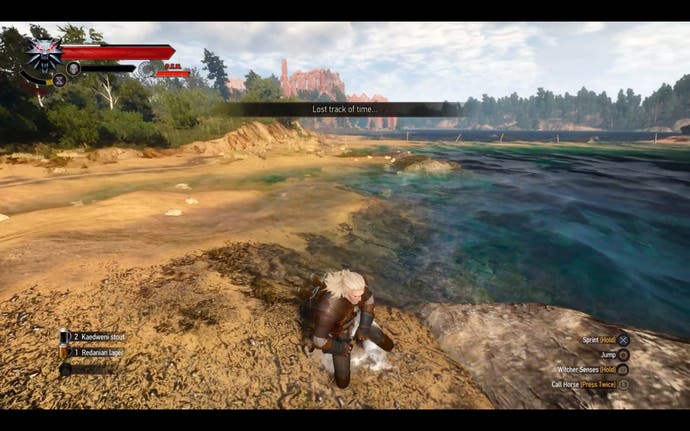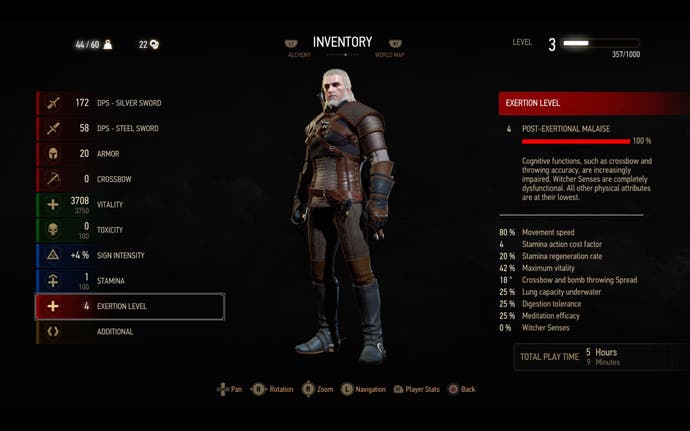Meet the long COVID activists modding Elden Ring and The Witcher to raise awareness
"We are failing to get the message across that this is really dangerous."
One major obstacle to fighting long COVID is that we're still working out what it is. In the absence of a scientific consensus on what is still an emerging medical phenomenon, the World Health Organisation defines the condition loosely as "the continuation or development of new symptoms 3 months after the initial SARS-CoV-2 infection, with these symptoms lasting for at least 2 months with no other explanation." The most common long COVID symptoms, according to the UK National Health Service, are extreme tiredness, shortage of breath, muscle aches and loss of smell. But patients may experience many other, seemingly random symptoms, from tinnitus through diarrhoea to memory loss. The condition's progression can be unpredictable, too: people may get better only to relapse weeks or months down the road.
Long COVID is a life-altering disease that now affects tens of millions of people worldwide. It may leave you unable to do your job, go to school, socialise, or exert yourself in any way without needing to lie down. Beyond the immediate physical toll, it can have severe knock-on effects on your mental health. But given the range and apparent arbitrariness of its effects, and the current lack of a universally accepted test for long COVID, articulating its impact to those who aren't affected can be difficult. Some symptoms, such as post-exertional malaise, might not be obvious to other people, making it harder to claim health insurance, justify time off work, or simply explain to your children why you suddenly need to spend the afternoon in bed.
"It's an invisible illness," says Chantal Britt, co-chair of non-government organisation Long COVID Europe, who came down with long COVID herself after catching the virus in March 2020. "You don't see that I'm sick. I mean, you look at me, and you think 'she's a bit older', but I don't look sick. I struggle to explain it to anybody. And my kids, you know, they look at me, particularly the boys, because they're not affected. And they always say, what's wrong with you? Why don't you run marathons any more? You know, I simply can't. It's impossible."
Long COVID Europe is a network of national long COVID support groups, founded to raise awareness of the condition and advocate for state intervention and medical research. Among the organisation's initiatives is a video game project, Long COVID Mode, which is jointly run with marketing agency Saint Elmos. Launched in May, it's a series of free mods for the PC versions of popular games like Elden Ring, Minecraft and The Witcher 3, which try to simulate the more prevalent long COVID symptoms and so, help patients express what it's like to live with the condition.

"It's such a great way to get that message across, because you have to experience it yourself," Britt says. "Otherwise, you don't know what this is about, and it's difficult to explain. 'Fatigue' sounds a bit vague, and exertional intolerance, where you're simply not able to exercise or push yourself - this is really difficult to get across. And if you have an avatar that is affected by this, it's just a great way to get that across. For me, there's always a new challenge, a new symptom, they pop up left and right. I try to come to terms with one, and then a new one starts."
The mods themselves were devised in collaboration with modding teams from around the globe, all working pro bono. In the Elden Ring mod, developed by Garden of Eyes, players move and replenish stamina slower by default - even rising to your feet after sitting at a Site of Grace is a laborious process. Players may black out at random, "forget" runes - the game's metaphysical level-up currency - or injure themselves while healing due to digestive problems. Their characters may suddenly feel exhausted and need to halt for a few seconds, right in the middle of a boss encounter.
"We tried to translate those symptoms into the game without changing the core game mechanics," explains Garden of Eyes. "We tried to build upon them, to make something that matches with those symptoms. So for example, losing track of time and blackouts. Elden Ring has time-of-day mechanics. So we made the screen go black, and then changed the time. For having headaches and needing to stop, we reuse some animations in the game - we have to code them to make it happen randomly. We basically just tried to simulate as many symptoms as we can."
The Witcher 3 long COVID mod, devised by Stellar7Project, works with and against the CD Projekt game's role-playing elements in similar ways. Amongst other things, it introduces four exertion stages, with increasingly severe symptoms at each threshold. At stage four, you'll be unable to use Geralt's supernatural Witcher senses and may randomly drop items when accessing your inventory.

"They approached me to make this because it was similar to what I'd done in another mod, The Witcher 3 Redux," says Stellar7Project. "And because the mechanics were similar it was quite simple coding-wise. I've worked with all those kinds of mechanics before. I just had to make it more extreme this time."
One obvious concern when it comes to modifying commercial video game blockbusters to teach people about long COVID is the risk of trivialising the condition, and adding to the climate of misunderstanding. These games are designed for escapism, not education, and higher difficulty modes - which may involve questionably realistic simulations of disease - are often portrayed as a masochistic thrill. Could the long COVID mods misinform people about the condition, and cause additional distress for those living with it, by styling it an enjoyable endurance test akin to playing Fallout: New Vegas on Hardcore difficulty?
Britt agrees that some people might find the concept hard to countenance, but argues that being able to reference the mods in conversation has been liberating for the patients she works with - especially children. "I completely see your point, but first of all, we have a lot of kids who are gamers and who are affected by long COVID. And for them, this is the greatest thing - they love it, because they can explain to the guys they're playing with what they're affected by."
Britt doesn't think there's a risk of misinforming people about long COVID, because after all, these modded games are still works of fantasy - they might offer useful insights with a view to cultivating empathy, but there's no pretence of being directly factual. "We feel the mods do a good job at informing a new audience by using analogies and languages from a world that is familiar to them. They give us a way to show some of the things we feel, like exertion intolerance, which is one of the main symptoms and difficult to understand if you don't experience it. The mods also let us highlight some of the lesser-known symptoms like the different effects of cognitive dysfunction and gastrointestinal problems. As the mods are a part of virtual characters, it is obvious that the information is not trying to challenge clinical descriptions and medical advice.
"All the mods are based on the effects, attributes, and items that are already available in the games. For example, in the Elden Ring Long COVID Mode, [the representation of] post-exertional malaise borrows from the already existing Madness animation. Players and their followers do understand this. They do realise that we are just repurposing their games in a creative manner to educate them about something that they otherwise would never stumble upon."
It's vital for long COVID support groups to broach the subject more inventively, Britt goes on, given how desensitised people are to talk of COVID in general after years of lockdowns and media coverage. "I think we have to think in different ways, and not see it as a negative to have a playful approach. One of my favourite games before I had COVID was Pandemic. It's a game where you infect the world as a virus. And you have to think like the virus to be able to do this. It's not that funny any more, after the pandemic! I thought this is crazy, you know - to have that kind of game, but it [can also be] strategic. At the end of the day, this is an experience that gets the message across, it's a tool. The means are justified if the result is there, and I think we've reached new people who've never been affected by it."
Making people aware of the risk of long COVID is as important now as it was during the early years of the pandemic, when infections were spiking across the world. After several waves of vaccinations, case numbers have fallen dramatically and the immediate effects of catching the dominant strains of COVID are broadly less severe than they were in 2020, though the situation varies enormously by region. But several studies suggest that repeatedly contracting the virus can have terrible consequences, as each infection raises the odds of developing lasting symptoms.
"If you're reinfected four or five times, that's when some of the younger people get it, and more men," Britt says. "There's just more people affected now. And they're completely not aware of this, they didn't even know this existed. Or they think, 'I never got long COVID the first few times I was infected, so I will never get it'. And they're shocked. They're young guys, and they simply don't know what's happening - sporty people as well.
"We are failing to get the message across that this is really dangerous. You don't want this. You don't want to take the risk. If people knew - if I had known, I would have protected myself, of course. But you can't get that message across just by telling people that you get fatigued."


